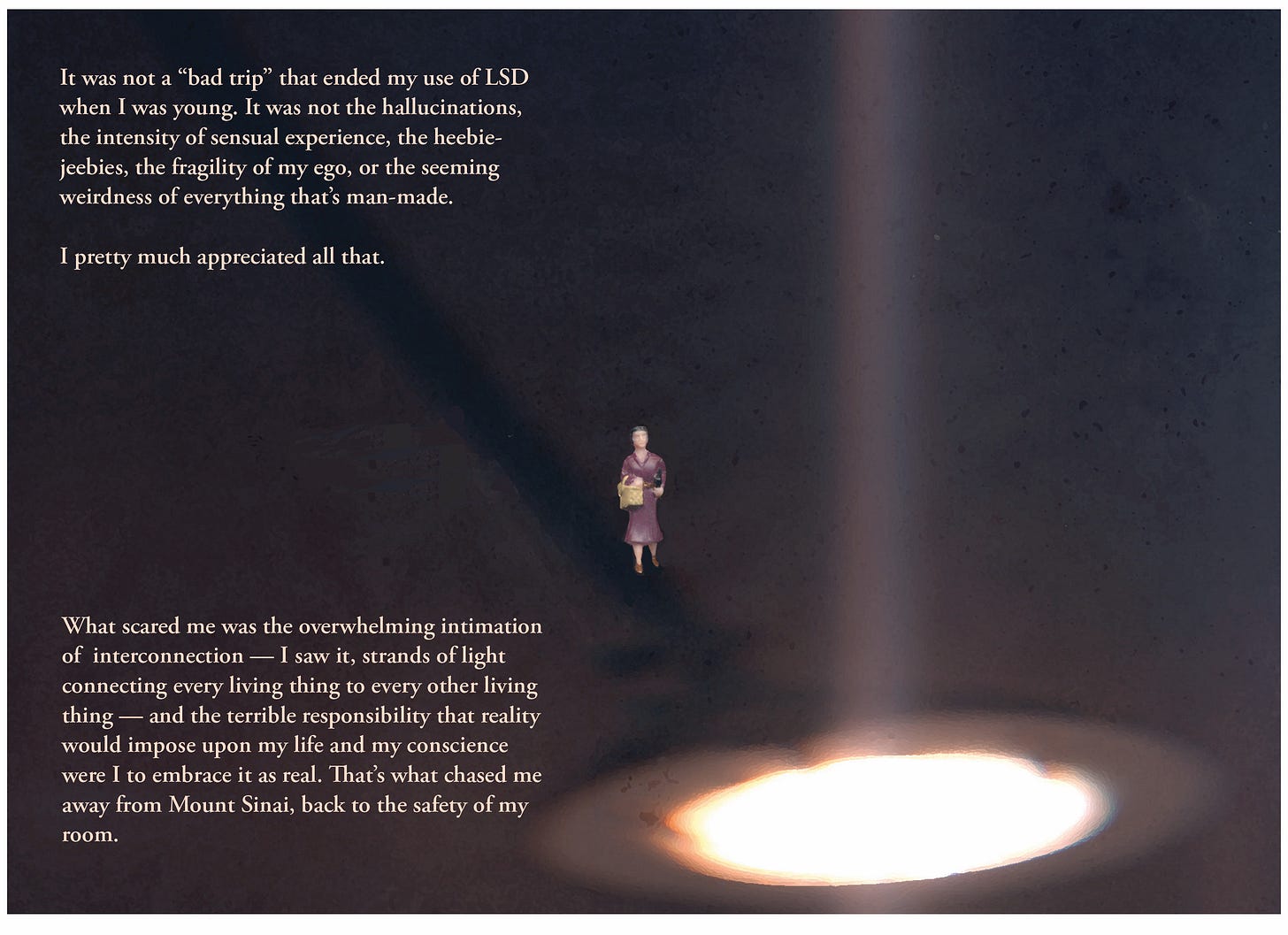I was the parent of young teenagers, struggling with how the War on Drugs was interfering with my freedom to parent them, when I wrote “Drugs and Jewish Spirituality: That Was Then, This Is Now” in the May-June 1999 issue of Tikkun magazine. The piece, which identified the powerful role psychedelics had played in the mental lives of several contemporary Jewish notables, was eventually reprinted in Hallucinogens: A Reader, edited by Dr. Charles S. Grob of the UCLA School of Medicine — which led, in 2006, to my interviewing him and four other psychedelic researchers for Jewish Currents magazine.
Among them were Rick Doblin, a Harvard Ph.D. who became the founder and leader of MAPS (the Multidisciplinary Association for Psychedelic Studies), which has been the driving force behind the growing acceptance of experimental psychedelic therapies in the mental health world. Ever since talking with him, I’ve been receiving and reading the MAPS quarterly bulletin — now in its 31st year — and I’m delighted by how much the publication has grown in range and depth from what used to be rather dull reports about small clinical studies to the exploration of major moral, ethical, social-justice, and medical issues.
In the most recent issue, for example (Volume XXXI Number 3, 2021), there’s an article about how psychedelic experimenters can best interact with indigenous peoples with respect and reciprocity; an essay that asks whether psychedelics can “promote social justice and change the world”; an interview with Michael Pollan, whose wonderful 2018 book, How to Change Your Mind, very much enlivened public interest in contemporary psychedelic research; a piece about “Queer-Affirming MDMA-Assisted Therapy”; and a philosophical essay by Dr. Chris Letheby that asks: “Are the things that people experience on psychedelics real? Do these substances induce genuine insights into self and world, or just hallucinations and delusions?”
Such question about the reality of psychedelic perceptions very much haunted my own use of LSD and mescaline when I was a young man. Raised as a skeptic and an atheist, I found the LSD perception that “there is some deeper level of reality than the everyday empirical world,” as Letheby describes it, to be deeply compelling — and deeply unnerving. There I was, experiencing but not wanting to believe what I was experiencing! As I wrote in “Drugs and Jewish Spirituality,” these were
“‘mystical’ moments, tinged with madness, that involved a greatly intensified sense of metaphor and meaning, the dissolution of ego borders, the powerful ‘perception’ of what was real and illusory, natural and bizarre, holy and profane — and the manic longing to organize these insights into a redemptive system. Such episodes, deeply challenging to the rationalism that my family held dear, would leave me incapacitated by ambivalence. . . . And so, like the Hebrew people at the foot of Sinai, I ‘fell back and stood at a distance’ (‘Let not God speak to us, lest we die,’ Exodus 20: 15-16).”
The graphic below, which is a page from my new book, American Torah Toons 2 (soon to be published by Ben Yehuda Press), serves as a commentary on that very Torah portion, Exodus 20: 15-16. Clearly, even as an old guy, I’m still gnawing the same bone.
Happily for me, Chris Letheby is also a rationalist, or what he calls a believer in “naturalism,” “that the natural world studied by science is all that exists.” But “why not take psychedelic experiences themselves,” he asks, “as strong evidence against naturalism?” His “basic answer is that a naturalistic worldview has the resources to explain the many strange and striking features of psychedelic experience that often prompt non-naturalistic interpretations.
“[P]sychedic therapy,” he concludes, “does not work mainly by changing people’s metaphysical beliefs — even though it sometimes does that. Rather, it works mainly by disintegrating mental representations of the self, which can become rigid and dysfunctional . . . ; this allows these self-representations to be revised for the better.”
It is a relief for me that a psychedelic philosopher closely associated with MAPS is opting for naturalism, not mysticism, in his interpretation of psychedelic experience. Still, I’d probably be afraid — for the same old reasons — to once again experiment with LSD or mescaline, even as a wise old man.,
On the other hand, the experiences that Michael Pollan describes in How to Change Your Mind, which were therapeutically oriented and carefully designed, are downright tempting . . .




How about Just For Fun...
Good piece larry i agree though that profit mitive is lurking take ‘toad’ for example also i believe those ‘luscious ‘ psychedelics belong in the past for us altes’